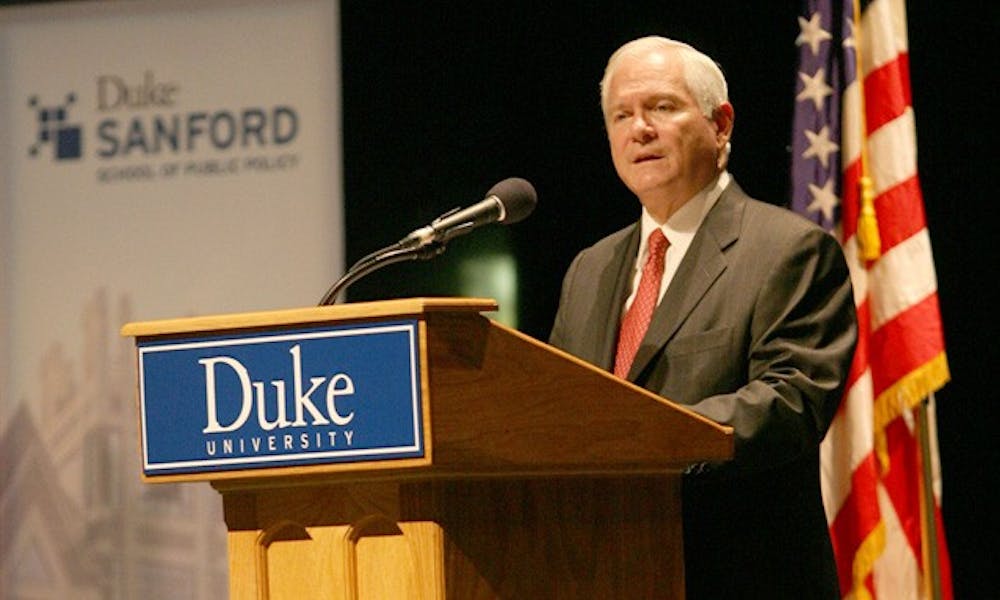After discussing the state of America’s all-volunteer military force, U.S. Secretary of Defense Robert Gates implored Duke students to “earn their freedom” Wednesday night.
Speaking to a packed Page Auditorium, Gates reflected on both the benefits and consequences of maintaining voluntary service in wartime, arguing that although the system has improved military performance, it has also come at an unsustainable price and placed extraordinary strain on a small sliver of society. The secretary also stressed the degree to which many Americans have become disconnected from the wars in Iraq and Afghanistan and asked young people to consider how they can give back to their country.
“Even after 9/11, in the absence of a draft, for a growing number of Americans, service in the military, no matter how laudable, has become something for other people to do,” he said. “Think about what you can do to earn your freedom—freedom paid for by those whose names are... in veterans’ cemeteries across this country and across the world.”
Gates, the only secretary of defense to be retained by a newly-elected president, spoke for about half an hour before taking several questions from an audience of students, faculty, media and Reserve Officer Training Corps cadets from Duke and nearby schools.
Gates’ presence resonated with the military community. Prior to delivering the Ambassador S. Davis Phillips Family International Lecture, Gates spoke to the ROTC units separately in the Bryan Center, said Peter Feaver, professor of political science.
The American Grand Strategy Program, for which Feaver serves as director, sponsored the event along with the Triangle Institute for Security Studies, the Office of Global Strategy and Programs and Duke’s “A World Together” initiative.
“To us, he talked about the challenges that would face us as leaders, specifically in the Army and the Air Force,” said sophomore Evan Halton, an Army ROTC cadet.
Gates was introduced by President Richard Brodhead, whom he knows from his days as president of Texas A&M University. Indeed, Gates began his remarks in Page by jokingly comparing his current post to his previous one in academia, but he soon turned serious about the young people for whom he has long been responsible.
“Instead of wearing J. Crew, they wear body armor. Instead of carrying book bags, they carry assault rifles,” he said. “And a number of them—far too many of them—will not come home to their parents.”
Although he stressed that the volunteer force is more experienced than past forces built through conscription, Gates noted that it makes up less than 1 percent of the American population. He added that this small segment is comprised of individuals who disproportionately hail from military families and rural areas, especially in the South and Mountain West.
“There is a risk over time of developing a cadre of military leaders that politically, culturally and geographically have less and less in common with the people they have sworn to defend,” he said.
Gates went on to commend Duke for maintaining its ROTC program when other elite universities banned it in protest of the Vietnam War and the military’s “don’t ask, don’t tell” policy. Students at schools like Duke have a special responsibility, he added.
“Will the wise and honest here at Duke come help us do the public business of America?” he asked in closing. “Because, if America’s best and brightest young people will not step forward, who then can we count on to protect and sustain the greatness of this country in the 21st century?”
The appeal came as a surprise to sophomore Hannah Colton.
“I wasn’t expecting it to be as much of a direct plea,” she said.
Get The Chronicle straight to your inbox
Signup for our weekly newsletter. Cancel at any time.

